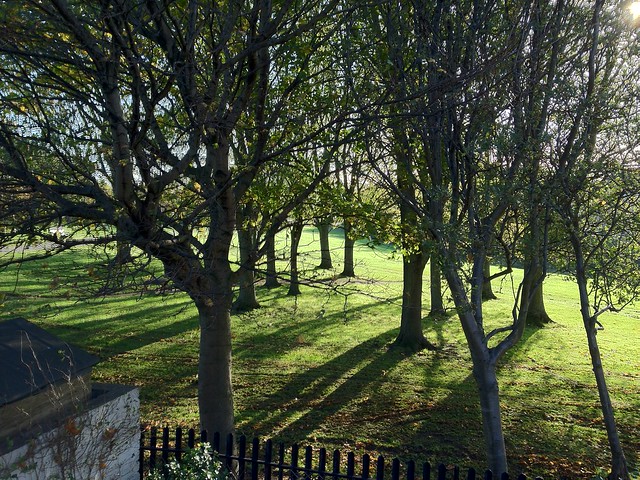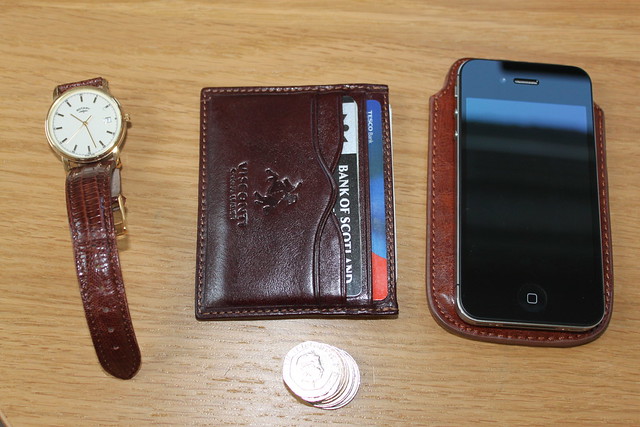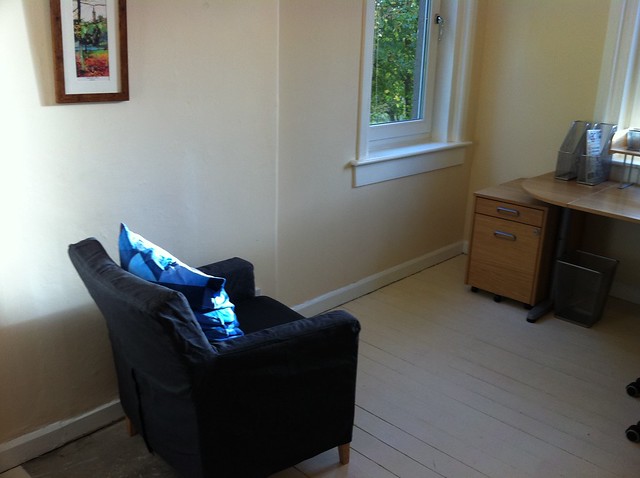I enjoy a certain aesthetic. I like things made from brown leather and light-coloured wood, from glass and metal and brick, from wool and cotton. I like cheerful (but not loud) colours. I like plants and sunlight, and open space.
I enjoy things that are natural and elemental, not artificial and adorned. I dislike plastic, and heat-sealed packaging and polystyrene. Above all, I enjoy simplicity. I’m willing to pay more, and do more, to get it. I could give dozens of examples, but a few should suffice:
- My key-fob has my car key and the two main-door keys to the house, and nothing else.
- My wallet is a (brown leather, obviously) card case, with four cards (ATM, credit, driving license and breakdown service) and a couple of £20 notes.
- I carry exactly two bus-fares of coins, and ruthlessly clean out small-denomination coins into a jar.
- My iPhone is in a brown leather sleeve, and has two screens of apps. I carry only a handful of playlists of music on it.
- I take photos on my phone, because I’m not much of a photographer (either in terms of skill or inclination), and the phone is more than good enough.
Of course, simplicity can also be about adding things, rather than removing them. I invest in technology that lets me carry less stuff, like a Kindle. A suitcase full of novels now fits into my hand-luggage. Sometimes, simplicity means carrying more stuff when you have a means (or device) to let you do something better. I’ll gladly carry an e-reader along with my laptop if I’m going to be reading for more than half an hour.
I’ll happily buy a smaller, lighter, better-designed bag whenever I find one (like my iPad and MacBook Air satchel). My blog is static HTML, and I went through the process of migrating to it because it provides me with conceptual simplicity and reassuring portability.
More importantly, I also believe in simplifying my life, offline and online, to let me focus on doing what I want to do – whether that’s writing code, writing words, or helping other people with their work. To do that, I have to reduce the ambient noise.
I follow comparatively few people on Twitter. I subscribe to few blogs, and I mostly read them via their feeds. I don’t subscribe to email newsletters, and I don’t follow any discussion groups. I switched comments off for this blog.
I’m still paying attention; indeed, I expend significant effort to follow what my peers and the industry are saying. I participate more than many people do, and I think that’s why people in turn tend to listen to what I say. But there comes a tipping point where you can be held hostage by that participation.
A major lesson I’ve learned (which I had to teach myself) is that it’s OK to cut out negative people from your life. Everyone has a right to their opinion, but people don’t have a free pass to be heard by you, particularly if their manner of expression is consistently unpleasant or unproductive.
It took me a long time to separate the enjoyment I get by knowing that people are interested in what I write, from a sense that I had some kind of democratic responsibility to listen to any sort of feedback, even the trolling and the ad hominems and the meaningless, illogical snarks. I think it’s an issue that a lot of us struggle with, whether we’re writing, releasing software, creating designs, or something else.
The truth is, it’s OK to curate your life. You’re allowed to manage your interactions with people, online as well as offline. We make choices every day that limit our exposure to things (or people) that are frustrating, confusing or unpleasant – and you’re still allowed to do that even if you have an audience.
When you’re creating a piece of work, your audience is your readers, or your viewers, or your listeners, or your customers. You still have the right to say no. You’re free to delete an email, and to filter the sender straight to the trash. You’re free to unsubscribe from a blog. You’re free to mute, unfollow or block someone on Twitter. You’re free to not talk to someone who’s consistently, unproductively negative.
It’s just part of the search for simplicity, and focus, and elegance in life – which is something that creative people desperately need. Don’t remove yourself from contrary opinions and criticism (that’s how we grow), but be willing to take control of your environment.
Simplicity is a powerful thing, if you can find it. It can improve your creativity and focus, provide much-needed perspective, or allow you to declutter your workspace and your thoughts. It can also make you happier.
It often costs more, but I’ve found it to be the most worthwhile investment you can make. There’s nothing better for your work and your life than a quiet, focused mind.
(If you enjoyed this article, I always announce new pieces on my Twitter account.)


